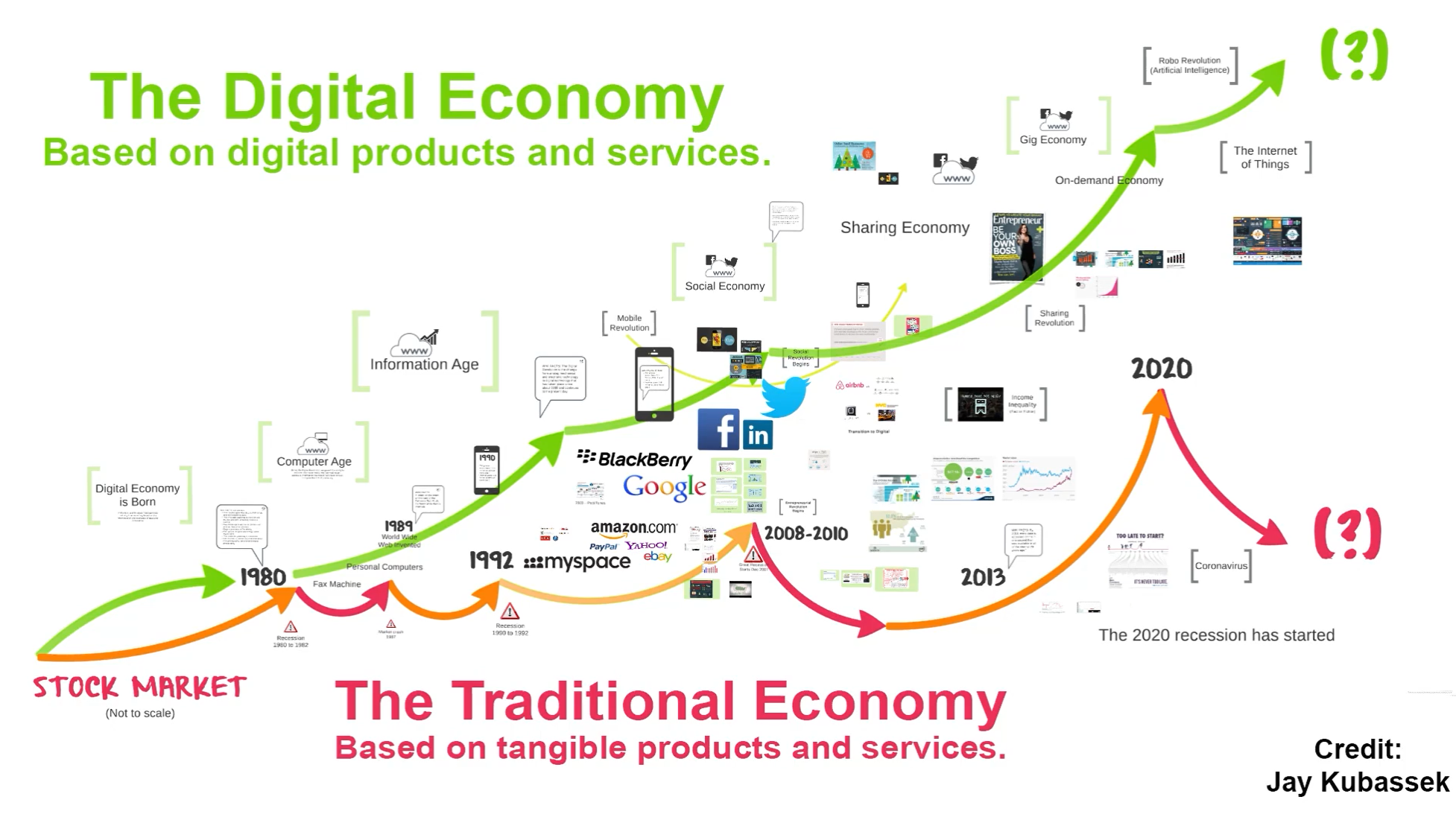For many years commentators have been discussing the increasing shift towards the use of IT by businesses and consumers since the early 1980s, but it is entrepreneur Jay Kubassek who has recently and succinctly outlined the increasing divergence between two distinct economies. Kubassek explains that one that has been dying a slow death for over 15 years and another that has exploded with 250% growth in the same time period. This dynamic shift towards online is most obvious in the diagram below. Digital has been increasingly the place to be for the past decade and as Kubassek explains the cyclical or boom and bust nature of the traditional economy means there is now safety in having an online presence. What is most striking about this is that everything that Kubassek (and others) have said about digital was pre-Coronavirus, the divergence observed will be even more marked now. So how are companies on both sides of the training fence managing in this rapidly changing environment; how has their approach to training, traditional learning and development evolved with lockdown; and how will it adapt post-virus?

The Training Consultant
Dave Otter is a Leadership Performance coach. He’s worked with many national and blue-chip companies to develop their leadership talent to deliver long-term business growth.
“Before the virus,” David said, “all of my leadership development work came from word-of-mouth recommendation and was nearly always delivered in group workshops or through 1-2-1 coaching – the virus, and its associated social distancing requirements, stopped all that.
“I’d considered using online learning, but hadn’t really decided how a consultant could compete with the software developers and learning management systems. During the lockdown, I have been able to utilise Zoom calls to support my 1-2-1 coaching practice, but the downtime has meant I’ve had the time to consider a new tiered-delivery strategy.
“I’m looking to increase my use of Zoom for individual and group coaching and finally once the virus is under control I’ll be looking to develop workshop delivery again, but the tiered strategy should provide a broader range of revenue streams.”

The Training Instructor
Pauline Caswell, a highly qualified Pilates teacher, shares a similar story. She said: “Before the Coronavirus, my Pilates classes appealed as much to individuals as corporate clients looking to offer their employees something different, but classes were face-to-face, I’d done some CPD on-line but not much else.
“Once the lockdown hit us, my classes stopped. Pilates is very ‘hands-on’, and an instructor needs to understand their clients’ needs and work closely with them. Eventually I have been able to use Zoom to deliver group sessions and most of my loyal students welcomed the opportunity to continue classes, although some of the less-tech savvy older clients have struggled, but I have noticed more enquiries and new customers from further afield, across the UK and even abroad.”
Pauline is now looking to maintain interest from potential clients via her new-look website and social media feeds, “but I do need to consider how my business will need to adapt post-virus. “Social distancing may continue for quite a while yet and the impact on classes will mean fewer people being able to attend, so my on-line offering will potentially need to expand to fill the gap.”
The Aviation Industry
Carol Dutton is HR Director at Liverpool John Lennon Airport. “The industry has been very badly affected by the virus; we’ve maintained emergency flights to the Isle of Man, but nothing else,” she said. “Before the virus we used e-learning for our mandatory training, it’s quick, easy to use 24/7 and provides an audit trail for CAA inspectors, but it is relatively basic. Although we’ve not used it during the lockdown we do see an evolving requirement for our Learning Management System once we emerge post-virus.
“We envisage more courses, more in-depth modules and a wider variety of users, but one issue we can see is the need to bespoke standard courses to the needs of our business, we see this as time-consuming but necessary if we are to realise the most out of the system.”
The long-term impact of the Coronavirus is yet to be fully understood but it is clear that the transition from traditional to digital economy forecast by Jay Kubassek and his peers continues, and, if anything in the world of traditional learning to e-learning, it’s accelerating.

